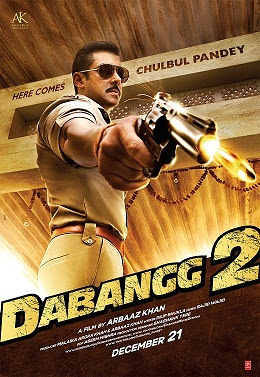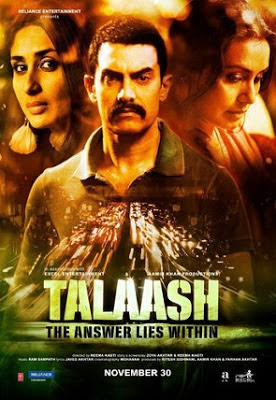|
Release date:
|
December 21, 2012
|
|
Director:
|
Arbaaz Khan
|
|
Cast:
Language:
|
Salman
Khan, Sonakshi Sinha, Prakash Raaj, Deepak Dobriyal, Vinod Khanna, Arbaaz
Khan, Mahie Gill, Guest appearances by Malaika Arora Khan and Kareena Kapoor
Hindi
|
I
can’t recall the last Hindi film I saw which had such a sequentially
compartmentalised screenplay … first the hero fights or has a fiery conversation
with a villain, then he throws himself into a song and dance, then he has an
emotional or humorous encounter with his family … next the hero fights with the
villain, then he throws himself into a song and dance, then he has an emotional
or humorous conversation with his family … cut to fight or conversation with
villain, then song and dance, then family … String all these scenes together,
change the order a couple of times, make sure Salman Khan is in every single
scene, and you get Dabangg 2. The
first half hour of the film is hilarious, and Salman’s Chulbul Pandey remains a
charming shade of grey – a Robin Hood-style policeman who fights for the people
while taking money from the bad folk to give to the good folk, including
himself. It’s amusing to see Salman dance to a ringtone yet again; it’s worth a
chuckle when in one song, before he plants his hands on his belt for that
memorable Dabangg dance move, his
belt actually moves on its own. But after the interval, the repetitiveness of it
all gets cloying (by the time the hero and the brother of the main villain both take
off their shirts to display their muscles in the final fight, precisely as we saw it
happen in Dabangg, it’s actually a
bit of a bore) and as the film rolls along, the jokes get scantier, the songs
are one too many, the music gets boring, the pace slackens, the film feels
episodic and the insubstantial writing is shown up for what it is. A pity,
because that first half hour was so promising!
The
storyline is thinner than dangerous ice: from Laalgunj in Dabangg, Chulbul Pandey has now moved to Kanpur for Dabangg 2, and the earlier goon Chhedi
has been traded in for politician Bachcha (Prakash Raaj). Chulbul quickly
becomes a darling of the press and public in Kanpur, but inevitably clashes
with Bachcha. Honestly, there’s nothing more to tell. The screenplay lacks fresh
ideas, and is a painfully obvious attempt to cash in on Salman’s charisma and the
success of Dabangg 1 beyond his
traditional fan base. Sure, there are a couple of punchlines thrown in here and
there but not one that’s even half as whistle-worthy as the “Chhedi Singh … chhed karenge” punning from the first instalment. In fact, some of
the better lines in Dabangg 2 go to
Chulbul’s sidekicks who come in the form of his cop colleagues. But that
happens, I suspect, by pure accident, since it’s clear that we’re meant to be
in Chulbul’s thrall throughout with all the other characters relegated to the
margins. So inconsequential is everyone but Chulbul, that talented actors like
Prakash Raaj and Deepak Dobriyal are simply wasted in the roles of villains
unworthy of this hero; Salman’s brother Arbaaz Khan (also the director of this
film) returns to the franchise as Chulbul’s half-brother Makkhi but disappears
for a large part of the story; Sonakshi Sinha as Chulbul’s wife Rajjo has little
to do beyond lower her eyelids and flash her profile; and
there’s an inexplicable track to the storyline involving Mahie Gill and Arbaaz.
I
loved the wild lunacy that was Dabangg.
Although parts of Dabangg 2 are
enjoyable, the film is not a patch on its predecessor. In fact, I came away
feeling that nothing much had happened in those 128 minutes of running time. In
the midst of all this, Kareena Kapoor makes an appearance to dance to the song Fevicol se which is thrown into the mix
because … well ... I guess because Dabangg
had Munni badnaam hui, so this film
had to have an equivalent, no? I’m all for raunchy lyrics if they are fun; I’m
all for a celebration of sexuality, especially in an era where Hindi film heroes
are stripping off their clothes with as much elan as heroines. But is it okay for
a film to feature a woman singing, “Main toh tandoori murgi hoon yaar, Gatkaale
saiyyaan alcohol se” (which pretty
much means, “I’m a piece of flesh, come consume me with alcohol”) while the
nice-guy hero cheers? Just this morning, the newspapers carried a quote from
actress Anushka Sharma in reaction to the horrific Delhi bus gangrape and the
accusation that the Hindi film industry has a long tradition of encouraging
sexual harassment: “The problem is not the way women dress, look or speak in
films, but the mind of the man who sees them as a piece of flesh,” she said. But
what of this film that exhorts men to view a woman as “a piece of flesh”? Will
the industry take some responsibility now? Please!
Even
for those who would rather not concern themselves with such matters but would prefer
to look at Dabangg 2 entirely from
the entertainment point of view, the truth is that it’s a big disappointment
despite the engaging start. The film is fun and funny only in parts, not a
complete washout but certainly a completely unworthy successor to Dabangg. The Khans parted ways with director
Abhinav Kashyap after the success of that film, and decided that Arbaaz would
helm Part 2. Since the final scene of Dabangg
2 sends out a clear message that Dabangg
3 is on the cards, perhaps it’s time to rectify that mistake.
Rating
(out of five): **1/2
|
CBFC Rating (India):
|
U/A
|
|
Running time:
|
128 minutes
|





